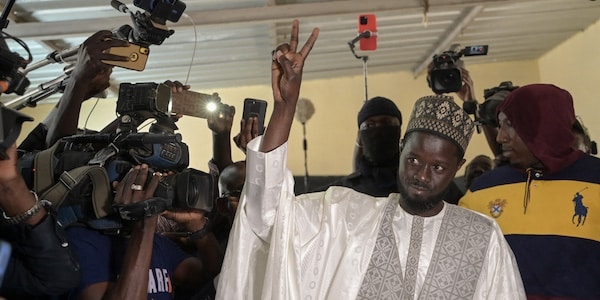On March 29, the Constitutional Court of Senegal confirmed Bassirou Diomaye Faye as the next president-elect of the West African country, assuaging fears of a constitutional crisis after the political outsider won the election the previous week.
But what do these developments mean for Senegal, West Africa, and the world?
‘Anti-system’ and ‘left pan-Africanist‘
The 44-year-old Faye will be the youngest president of Senegal. His victory is considered an upset–Faye is a self-described “left pan-Africanist” and his pledge to pursue significant systemic reforms in the country has been well received, in particular by Senegalese youth. Faye won as an independent after his party, the African Patriots of Senegal for Work, Ethics, and Fraternity (PASTEF) was unilaterally dissolved in July 2023 in a crackdown on opposition protests by the incumbent government of President Macky Sall, as covered last year in Liberation News.
The leader of the party, Ousmane Sonko was arrested along with Faye and barred from running in the 2024 presidential election. Sonko and Faye, who had been arrested earlier in 2023, were released along with hundreds of other political prisoners on March 14–just ten days before the election. Their release was triggered by the Constitutional Court barring an attempt by incumbent President Macky Sall to postpone the elections over concerns about which candidates were legally eligible to run.
The court overturned this move, affirming that Sall must leave office on April 2. Sonko ran for president on the PASTEF ticket in 2019, receiving just over 15% of the vote. This year, Faye stepped in as the party’s candidate as Sonko’s legal eligibility remained in question and decisively won with 54.3% of the vote in the first round over incumbent Prime Minister Amadou Ba’s 35.8%.
Tectonic shifts in West Africa
Comparatively, one key campaign promise made by Faye was that Senegal would look at pathways to abandoning the CFA Franc, the French-controlled currency that is a cornerstone of neocolonialism in West Africa.
“There is no sovereignty without monetary sovereignty,” Faye stated at a press conference earlier this month.
Other elements of Faye’s program are very similar to Sonko’s 2019 run and include combating corruption, reorganizing certain governmental positions, reducing the power that France still maintains in the country, and a reevaluation of the country’s energy imports. These moves point toward an undeniable trend toward reasserting sovereignty, pursuing regional integration, and seriously tackling underdevelopment across West Africa.
It is clear that the establishment in Senegal considers a progressive electoral victory to be more acceptable than sharpening and exacerbating a potential constitutional crisis, especially in the context of the popular-backed military governments that have taken power in Mali, Burkina Faso and Niger, which have united to form the Alliance of Sahel States. There is a long history of relations between the peoples of these countries, before, during, and after the colonial period, including the short-lived Mali Federation (1959-1960) which included modern-day Senegal and Mali.
How will the imperialists respond?
French President Emmanuel Macron and U.S. President Joe Biden both quickly issued statements congratulating Faye on his victory. Macron went a step further, speaking with Faye over the phone to offer “warm congratulations” and express France’s desires to “intensify” the “partnership” between the countries. On his part, Faye has stated that Senegal would remain a “trustworthy partner” of foreign allies.
This is on the heels of an announcement from Macron in late February that France would be pursuing a “new, balanced relationship” with Africa in the context of having its troops expelled from Mali, Burkina Faso and the Central African Republic in recent years. The “new era” described by Macron essentially amounts to some methods of joint administration at the remaining French military installations in West Africa–not a withdrawal.
The United States is also scrambling to find a path forward for its neocolonial projects on the African content in this tumultuous time. In mid-March of 2024 Niger, which hosts the largest U.S. drone base in Africa and is a key asset in the Pentagon’s AFRICOM, announced its intention to expel all U.S. troops from the country. The United States also operates a naval air base in Dakar, Senegal. As the westernmost point on the African continent, the base at Dakar serves as an important logistics and refueling hub and it is worth noting that initially after taking power, the military government of Niger did not immediately target the U.S. bases, focusing first instead on the French presence in the country.
The people of Senegal have yet to see what transformations begin to take place with Faye as the new Senegalese president. It is clear, however, that Senegal is among many West African nations which are moving toward a radical shift away from the French neocolonial domination that has historically crushed their country. There is part of a broader trend of anti-imperialist and anti-colonial changes taking place in West Africa where Senegal fits in this context, and what transpires for the people remains to be seen as progressive changes take place.

